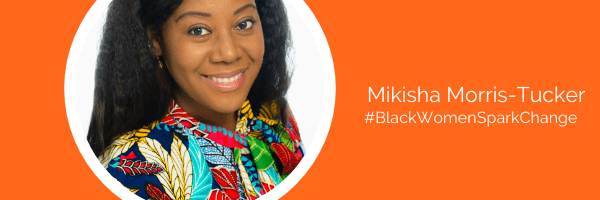
After studying film production in college, then working for a time in corporate communications, Mikisha Morris-Tucker was recruited by a mentor to build programs in the Philadelphia school system to serve students of color in predominantly African-American and Latino neighborhoods.
Mikisha took students to New York and Washington DC for cultural activities, and had speakers come to educate them about college and career readiness, and the arts. The goal was to instill an appreciation for their culture and heritage, and postsecondary preparedness. “At that time, they weren’t even seeing the beauty in who they were,” she says. “And the beauty in their culture and the beauty in their community.”
Opening the eyes of those students to worlds they hadn’t known awakened her to the difference between just having a job and doing purposeful, meaningful work. “I realized, ‘Look, I need to wake up every day and feel good about the work that I’m doing. I need to come home at the end of the day, regardless of whether I’m tired and burnt out, and know that I’ve made some form of difference in someone’s life.”
She continued to work in education, securing resources for lower-funded schools, developing citywide programming and improving technology infrastructure. But she also became aware of the flaws in the system — business and political considerations that slowed progress. They didn’t deter her. “I said, ‘I’m going to break through all of these barriers, I’m going to find myself a seat at this table where I can advocate on behalf of Black and brown children.’”
A Job Loss, Then Major Life Changes
Budget cuts in the Philadelphia school district led to Mikisha losing her job at the tail end of her doctoral program in education. “I’m getting this degree to do this work within this organization. And now I don’t have this job, in the place where I’ve gotten so comfortable. But that’s a good thing. Because what it does is it propels you into something more, it pushes you towards a different goal that you may not even have realized for yourself. And what that was, was it pushed me to New York City.”
Her love of the arts prompted Mikisha to take a job as the Executive Director of the Langston Hughes Community Library and Cultural Center in Corona, Queens. “It’s a predominantly Spanish-speaking immigrant community that historically was a Black community. So bridging the gap between the different cultures, ethnicities, and generations was always my goal. One day, we’d talk about Langston Hughes, and the next day we’re talking about Julia De Burgos. One day we’d focus on hip hop or African drumming, and the next day, mariachi.”
From that job, Mikisha found her way back into education when an opportunity opened up with the New York City public school system. But then an unwelcome diagnosis arrived: breast cancer. Only 40, and having gotten married just three months earlier, she wondered “How in the world is this happening?” The effects of treatments and surgery forced Mikisha to resign from her job to better manage her health and recovery. While she was in treatment, the pandemic hit and New York City went into lockdown. She’s now cancer free, but going through a personal health crisis in the midst of a public health disaster was not easy.
Don’t Put Yourself in a Box
Mikisha is now the Director of Operations for Stupid Cancer, a non-profit that serves adolescents and young adults with cancer. She oversees finance, marketing/communications and human resources. Acting on her belief that “we need to lift each other up,” she has also initiated trainings and conversations on racism and issues facing the LGBTQ+ community. “I’m in my first year with this organization, and it’s been a passion project of mine, making sure that we are ready to face our community with an empathetic heart, and with knowledge and understanding of what every type of community member is dealing with.”
Recently, Mikisha accomplished her goal of becoming a certified life and leadership coach. Drawing from her own life experiences, including dealing with cancer and losing a parent at 16, she hopes to coach others in setting their personal and professional goals and achieving them despite the challenges that life sometimes presents us. She says she will continue with her training and coaching in pursuit of her first credential, the Associate Certified Coach (ACC) credential
“We always have to look towards, ‘What’s that next thing?’ You can go from education, you can go to operations, and you can go to life coaching. You can do it all. That’s the important thing, realizing that you don’t have to put yourself in this little box and say, ‘Well, this is what my career is, and this is what I’m going to have to do for the rest of my life.’ No, the world is wide open and you need to grasp these opportunities and just not sit still.”
